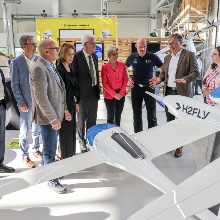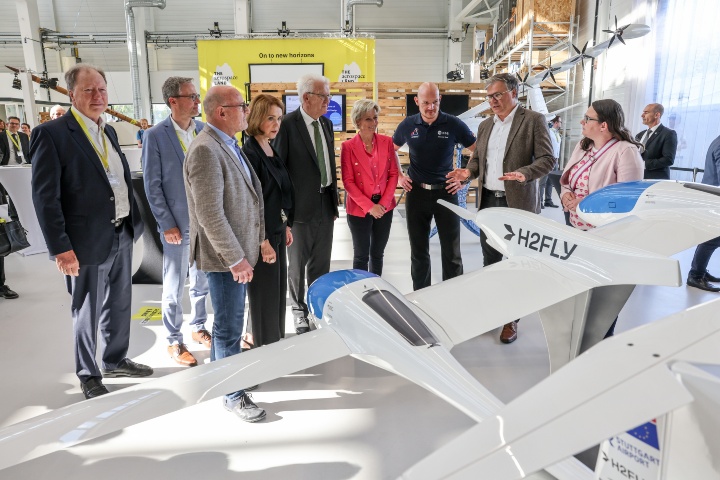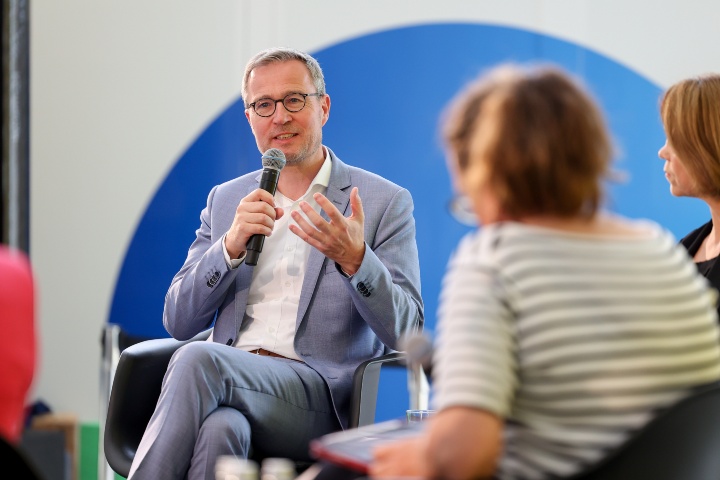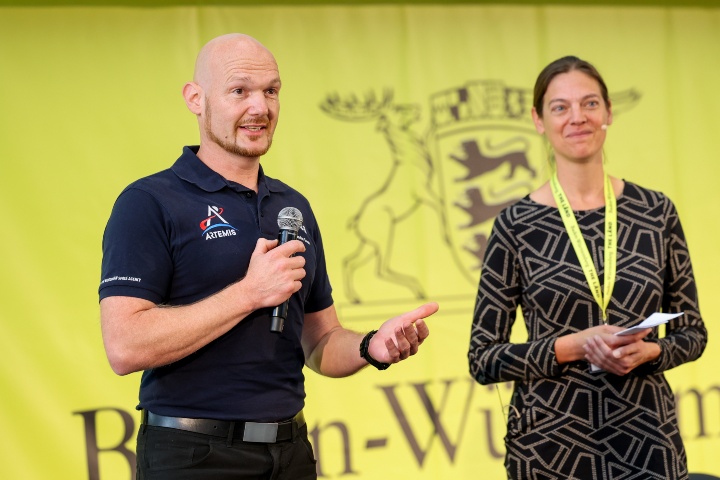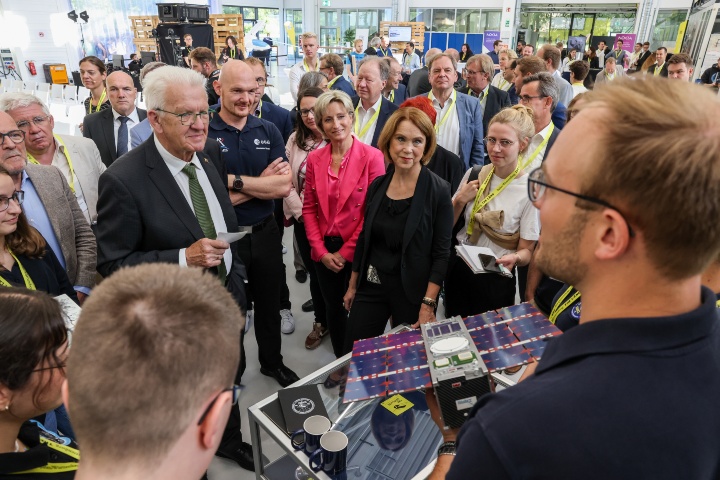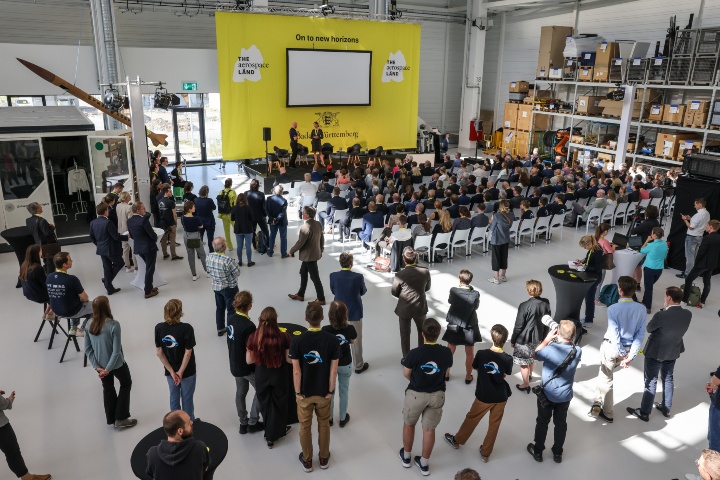The new state strategy THE Aerospace LÄND - the sustainable, digital plan for aerospace - has been officially launched at the University of Stuttgart. Premier Winfried Kretschmann and experts, such as ESA astronaut Alexander Gerst, agree that technological development for the future can only succeed if science, industry, and politics cooperate. And at the forefront of this: The University of Stuttgart as one of Europe's most important research and educational centers in the aerospace sector.
THE Aerospace LÄND pursues the goal of making aerospace sustainable, digital, and collaborative by 2050. "We want to be at the forefront of developments and play our part in ensuring European sovereignty in aerospace," emphasized Premier Kretschmann at the event. "Anyone who orders components, systems and drives from Baden-Württemberg must be certain that they will be supplied with cutting-edge technology that is as green and sustainable as possible."
Specifically, this means networking partners from industry and research and driving forward the research and development of new technologies to reduce CO2 in aviation, for example. The key stakeholders who play a key role in this came together on July 6, 2023 at ARENA2036 at the University of Stuttgart to present the strategy and provide insights into the research and development projects planned for the coming years: Start-ups, companies, and scientists, as well as students from research institutions presented their projects and ideas.
The University of Stuttgart as an innovator and incubator for talent
"Aerospace engineering is an important part of our university’s distinctive image. The fact that the launch of the Baden-Württemberg aerospace strategy is being implemented at the University of Stuttgart is a logical outcome of our work in this field and a great honor for us," emphasized Prof. Wolfram Ressel, Rector at the University of Stuttgart, in his welcoming speech. "We are more than ready to continue playing a leading role in Baden-Württemberg in the future."
Anyone who wants to help shape digital, sustainable aerospace needs bright minds working to get these ideas off the ground. "The University of Stuttgart has been conducting research in the field of aviation for more than 100 years and is one of the most important university training and research centers in Europe with excellent opportunities for cooperation," says Prof. Peter Middendorf, scientific coordinator of the state strategy, Vice Rector for Knowledge and Technology Transfer and head of the Institute of Aircraft Design at the University of Stuttgart. "We see our role not just in research and technological development, but in attracting and training the next generation of scientists." To this end, the university is constantly updating the curricula of its aerospace programs. "It's about adhering to the basics of providing a sound education and not abandoning any disciplines, while also adding new topics such as digitalization, alternative drive technologies, sustainability and entrepreneurship."
Gerst lit up the podium with his enthusiasm
"Is Baden-Württemberg THE aerospace LÄND?" asked Professor Sabine Klinkner of ESA astronaut Dr. Alexander Gerst. "The answer to that question is easy: Yes!" He went on to tell that little children have said to him: "Mr. Gerst doesn't have hair on his head, but he can fly into space. Then I can do that too.” He emphasized that it was important to convey an enthusiasm and fascination for space travel, and that could definitely be heard and felt at the event. He also highlighted that many people are aware that aerospace is of great value to society.
This was also the case for the aerospace students at the University of Stuttgart: The highlight for them was getting to talk to ESA astronaut Gerst in person. The two university groups KSat and HyEnD presented their technologies, including the PAPELL experiment. Gerst took PAPELL on board during his 2018 flight to the ISS to study the behavior of ferrofluids in space. "It's especially fun to work with technologies in space when you know they come from The LÄND," says Gerst. "When we're in space, we often think about who built the hardware. We appreciate that these technologies make it possible for us to go into space in the first place. You are the future." Finally, Gerst signed the PAPELL mockup, which will now have a special place in the university group's treasure trove.
Premier Kretschmann also praised the commitment of the students and their open, hands-on manner, as well as their successful projects: "Every time I visit the University of Stuttgart, I take the enthusiasm with me when I leave." The students, who were following the event via live broadcast in a tent in front of the ARENA2036 building acknowledged this with loud cheers and intermittent applause.
Tackling aerospace challenges together
In panel discussions, ministers and experts from research and industry agreed that the challenges of the future can only be mastered through interdisciplinary cooperation and an appropriate political framework.
"In aerospace, the culture of collaboration is already accepted practice. Within the Integrated Research Platform for Affordable Satellites (IRAS) project, there is already close cooperation in research and development between various industrial partners, applied research institutions and the University of Stuttgart," said Dr. Nicole Hoffmeister-Kraut, Minister of Economic Affairs, Labor and Tourism.
Baden-Württemberg's Transport Minister Winfried Hermann emphasized the importance of the state's role in creating an efficient and sustainable infrastructure for the aviation sector: "In addition to research, we need, for example, to establish industrial demonstration facilities and a binding legal framework as a basis for investment at home and abroad."
Petra Olschowski, Minister of Science, Research, and the Arts, highlighted the role of research and education in tackling the challenges facing the aerospace sector. "A large proportion of future aerospace engineering experts are studying at the University of Stuttgart," she said. "In Baden-Württemberg, the foundations are being laid for technical innovations such as aircraft with alternative drive systems and energy storage concepts, or even satellite missions that conserve resources."
What aerospace does
Space exploration is not for the purpose of conquering galaxies. The aerospace sector brings together key technologies and innovations from quantum technologies to artificial intelligence that we need for many applications. What happens in space is a service for our everyday life on Earth and enables us to shape it differently in the future. Key aspects of the discussions led by Stuttgart professors Stefanos Fasoulas, Zamira Daw, Peter Middendorf, Heinz Voggenreiter and Cordula Kropp were the subjects of modern intelligent traffic control, autonomous flying, cyber security, and climate protection.
As Gerst put it, "It's about creating awareness of how vulnerable our planet is and that it's our job to protect it." For Gerst, fascination, emotion, and an awareness of what needs to be done go hand in hand. "Tracking climate trends and finding out how our planet is doing is something you can only do by looking at the Earth from above."
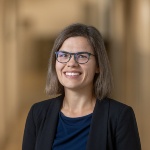
Lydia Lehmann
Deputy Head of University Communications
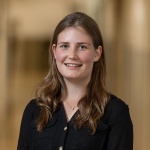
Jacqueline Gehrke
Online Editor


